Chapter 2: Year in Review
2.1 Overview
24. A total of 172 requests for legal advice were received at the pre-investigation and investigative stages, of which the majority were reoriented for resolution at the unit level or redirected to the civilian justice system where appropriate. In addition, 148 requests for pre-charge screening advice were received, resulting in 42 pre-charge reviews conducted by Military Prosecutors, with 45 files completed during the period. The DMP also received 26 referrals and Military Prosecutors rendered post-charge decisions in 27 files, preferring charges in 25, which represents a preferral rate of 93%.
25. In terms of litigation, the CMPS completed 32 courts martial, along with five (5) appeals and three (3) motions before the CMAC. No appeals were completed at the SCC, and no custody review hearings occurred during the reporting period.
2.2 Evolution of the Military Justice System
26. Now in its third year of operation, the intake and screening system introduced as part of the implementation of Bill C-77 has become a well-established and refined process. The enactment of Bill C-77, brought into force on 20 June 2022, introduced significant changes to the military justice system. Most notably, the creation of service infractions—now dealt with through summary hearings—has shifted the type and volume of cases referred to court martial. There is now a much clearer delineation between matters that can be appropriately managed at the unit level and those that warrant referral to court martial. Additionally, the legislative amendments have reduced post-charge delays by eliminating the need for cases to transit through a referral authority; charges are now referred directly to the DMP by the charge-layer.
27. In response to the changes brought by Bill C-77, the CMPS now provides pre-investigation advice to investigators of the CF MP Gp, where required under paragraph 102.02(2) of the Queen’s Regulations and Orders for the Canadian Forces (QR&Os). Since July 2022, all requests for CMPS legal advice—whether pre-investigative, during investigation, or pre-charge—have been submitted electronically through a centralized intake system. This centralized approach has enhanced the consistency and timeliness of legal advice provided to investigators across the CAF.
28. Incoming requests are first reviewed by the DDMP Ops, or a delegate, who either deals with the matter directly or assigns a Military Prosecutor to manage the request for advice. This triage process helps ensure that each case is assessed quickly and routed to the appropriate level of legal support.
29. Whenever possible and appropriate, DDMP Ops will reorient cases toward the Summary Hearing System. To do so, DDMP Ops reviews the summary of facts provided by the investigator and assesses whether the matter is likely to proceed to court martial. If it is not, DDMP Ops will clearly indicate that, should the matter be referred, the DMP would not prefer it for trial by court martial. This screening process has proven effective in ensuring that allegations suitable for resolution at the unit level are not unnecessarily advanced to court martial. It supports the expeditious and proportionate handling of alleged incidents while maintaining the discipline, efficiency, and morale of the CAF.
2.3 Agreement on Principles and Presumptions for the Exercise of Concurrent Jurisdiction
30. In response to recommendations 19 and 20 of the Report of the Third Independent Review of the National Defence Act, the DMP, in collaboration with the Federal-Provincial-Territorial Heads of Prosecution, adopted the Statement of Principles and Presumptions for the Exercise of Concurrent Jurisdiction by Canadian Prosecuting Authorities.Footnote 3 The DMP subsequently issued the Direction regarding the Implementation of the Statement of Principles and Presumptions for the Exercise of Concurrent Jurisdiction by Canadian Prosecuting Authorities.Footnote 4 Together, the Statement and the DMP’s Direction support a consistent national approach to managing concurrent jurisdiction and help to inform Canadians about the evolving relationship between the military and civilian criminal justice systems.
31. In parallel, and in alignment with the DMP’s interim direction implementing Madame Arbour’s interim recommendation that Criminal Code sexual offences no longer be prosecuted in the military justice system,Footnote 5 the DMP formally advised the Federal-Provincial-Territorial Heads of Prosecution Committee of this approach.Footnote 6 It is important to note, however, that while this recommendation was accepted by both the DMP and the Canadian Forces Provost Marshal (CFPM) in 2021, it did not apply retroactively to cases that were already in the military justice system at the time. As a result, several courts martial involving Criminal Code sexual offences continued within the military justice system. In accordance with the same interim direction, Military Prosecutors were required to seek the views of victims in each case, to determine whether they wished for their matter to proceed before a court martial or be referred to the civilian criminal justice system. In each of these remaining cases, victims expressed a clear preference for prosecution within the military justice system. Most of these matters are now approaching final resolution and the few remaining courts martial involving sexual violence offences under the Criminal Code will conclude during the next reporting period.
2.4 Case Management System
32. The Case Management System (CMS) is used to track the status of prosecution files and collect data throughout all key stages of the military justice process, including pre-charge, referral, post-charge, pre-trial, and trial. CMS records all significant dates related to each file, such as the date of referral to the DMP, the date the file is assigned to a Military Prosecutor, the date of the prosecutorial decision on whether to prefer charges, and critical milestones in the court martial process.
33. To support ongoing improvement and ensure alignment with operational needs, a CMS Change Manager has been designated within the operations section, and the system continues to be refined on a periodic basis to enhance functionality and data accuracy.
2.5 Files in Numbers
Pre-Investigation Legal Advice and Legal Advice During Investigations
34. CMPS received a total of 138 requests for legal advice at the pre-investigation stage. Of these, 93 were reoriented by DDMP Ops for resolution at the unit level, either through the summary hearing system or administrative measures. An additional five (5) requests were redirected to the civilian justice system, as they involved sexual violence offences under the Criminal Code.
35. CMPS also received 34 requests for legal advice during investigations. Of these, 11 were ultimately reoriented by DDMP Ops for handling at the unit level through the summary hearing system or administrative measures. None was redirected to the civilian justice system.
Pre-charge Screening Advice
36. During the reporting period, the CMPS received a total of 148 requests for pre-charge screening advice. Of these, 83 were reoriented by DDMP Ops for handling at the unit level, either through the summary hearing system or administrative measures. An additional five (5) requests were redirected to the civilian justice system, as they involved sexual offences under the Criminal Code.
37. Forty-two (42) files were assigned to Military Prosecutors to conduct a pre-charge screening review. The remaining requests were screened for other reasons, such as incomplete or missing information, duplicate submissions, or lack of jurisdiction.
38. In addition to the 42 new pre-charge requests assigned during this period, 10 files were carried over from the previous reporting period. Of the 52 total files under review, 45 were completed, with seven (7) remaining active at the end of the current reporting period.
39. The chart below presents the number of completed pre-charge screening requests over the past five reporting periods:
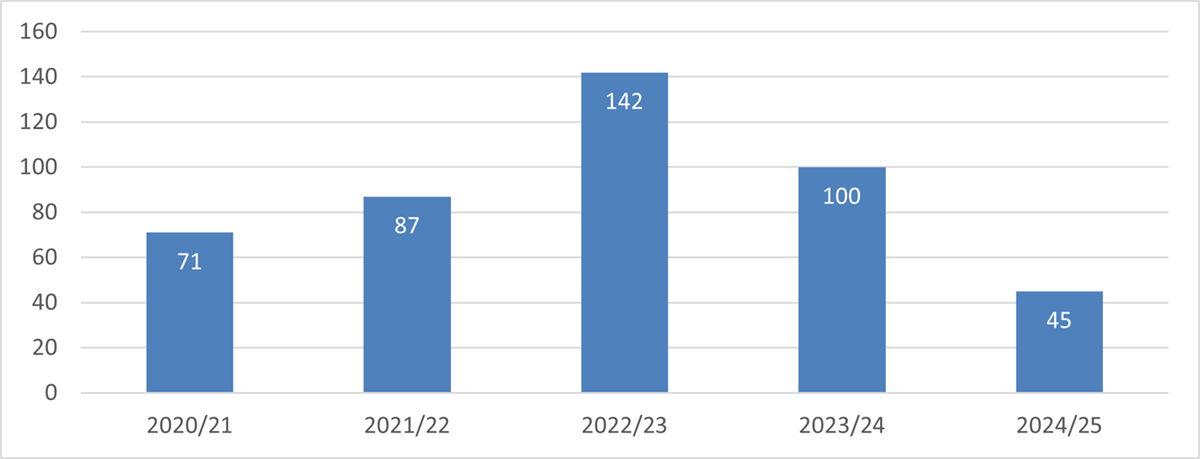
Graph breakdown: Number of completed pre-charge screening requests over the past five reporting periods
| 2020/21 | 2021/22 | 2022/23 | 2023/24 | 2024/25 |
|---|---|---|---|---|
| 71 | 87 | 142 | 100 | 45 |
Referrals
40. During the reporting period, the DMP received a total of 26 new referrals.
41. The chart below illustrates the number of new referrals received by the DMP over the past five reporting periods:
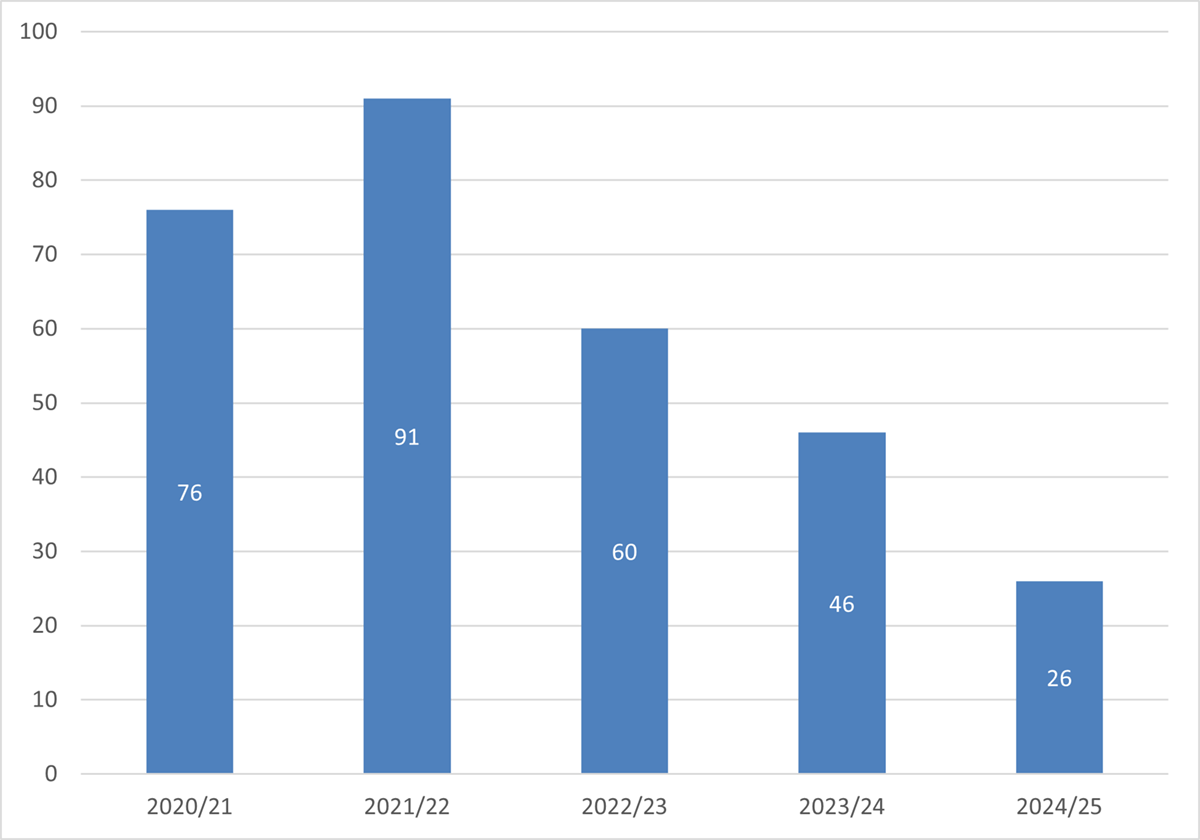
Graph breakdown: Number of new referrals received by the DMP over the past five reporting periods
| 2020/21 | 2021/22 | 2022/23 | 2023/24 | 2024/25 |
|---|---|---|---|---|
| 76 | 91 | 60 | 46 | 26 |
Preferrals and Non-Preferrals
42. Military Prosecutors rendered post-charge decisions in 27 files. Of these, 11 files had been referred prior to the start of the current reporting period.
43. Of the 27 post-charge reviews completed, Military Prosecutors preferred at least one charge in 25 files, resulting in a preferral rate of 93% for this reporting period.
44. The following figure presents the number of preferrals and non-preferrals over the past five reporting periods. For historical comparison, previous years also include instances where charges were referred to the unit for summary trial — an option that has been eliminated following the enactment of Bill C-77:
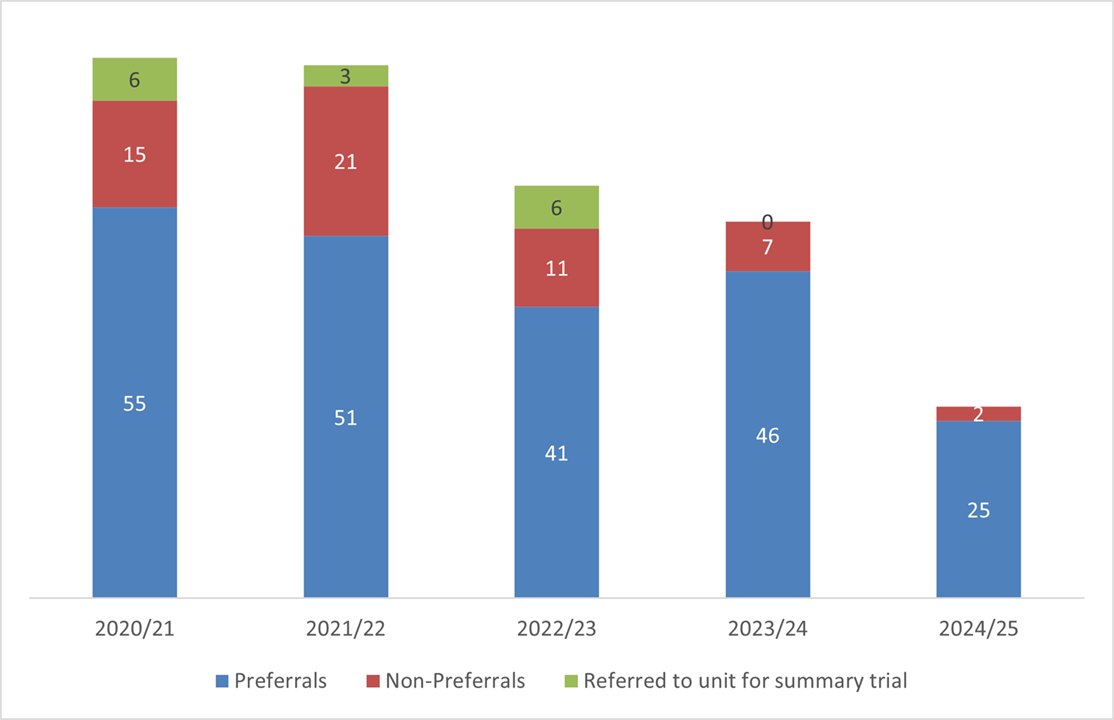
Graph breakdown: Number of preferrals and non-preferrals over the past five reporting periods
| 2020/21 | 2021/22 | 2022/23 | 2023/24 | 2024/25 | |
|---|---|---|---|---|---|
| Referral to unit for summary trial | 6 | 3 | 6 | 0 | 0 |
| Non-Preferrals | 15 | 21 | 11 | 7 | 2 |
| Preferrals | 55 | 51 | 41 | 46 | 25 |
Preferral Rates by Investigative Agency
45. Charges may originate from investigations conducted by one of three military investigative bodies: CFNIS, investigators with the CF MP Gp but who are not part of the CFNIS, or unit investigators. Since the implementation of Bill C-77, unit-led investigations are rarely appropriate for incidents likely to result in a court martial. While MPs may investigate service infractions under specific conditions, it should be exceedingly rare for a unit investigation to lead to the laying of a service offence charge. Allegations serious enough to warrant a court martial should be investigated by the MP.
465. Preferral rates vary by investigative agency due to differences in experience, training, and procedural proficiency among investigators. Non-preferrals may also result from material developments in a case between the laying of charges and the completion of the post-charge review.
47. During this reporting period, the preferral rates by investigative agency were as follows:
- Files investigated by the CFNIS: 100% (4 of 4 files were preferred);
- Files investigated by the regular MP: 92% (22 of 24 files were preferred); and
- Files investigated by a unit investigator: 50% (1 of 2 files was preferred).
48. The next figure provides an overview of preferral rates by investigative agency over the past five reporting periods:
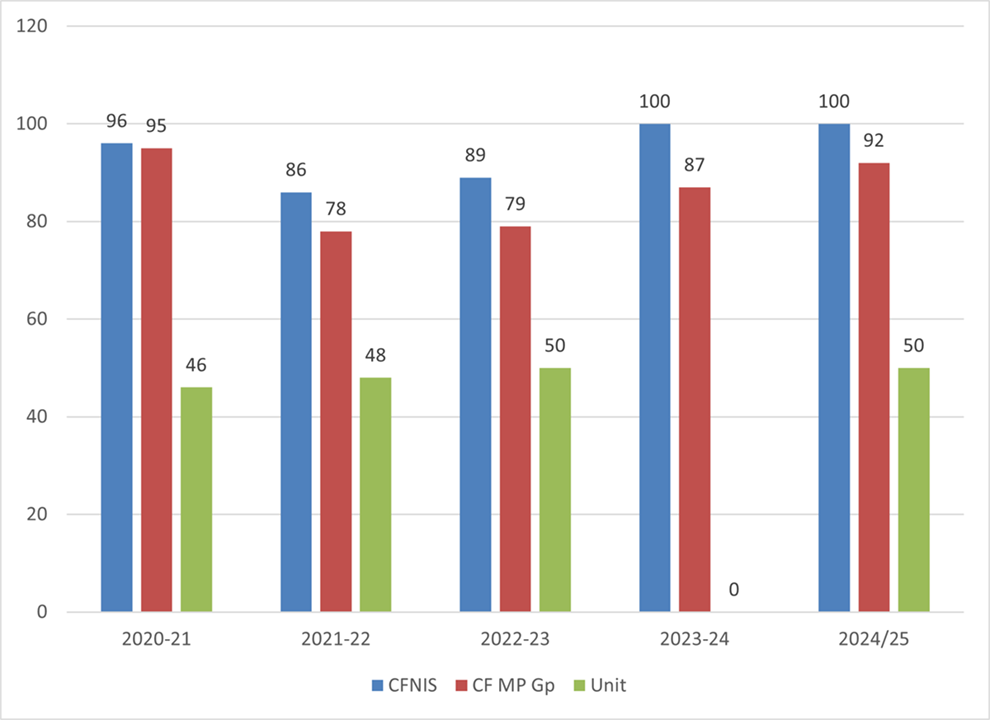
Graph breakdown: Preferral rates by investigative agency over the past five reporting periods
| 2020/21 | 2021/22 | 2022/23 | 2023/24 | 2024/25 | |
|---|---|---|---|---|---|
| CFNIS | 96 | 86 | 89 | 100 | 100 |
| CF MP Gp | 95 | 78 | 79 | 87 | 92 |
| Unit | 46 | 48 | 50 | 0 | 50 |
Courts Martial
49. A total of 32 courts martial were completed during this reporting period. Of these, 27 were Standing Courts Martial (SCM) and five (5) were General Courts Martial (GCM).
50. Annex A provides a detailed overview of the completed courts martial.
51. The following figure presents the number and type of completed courts martial over the past five reporting periods:
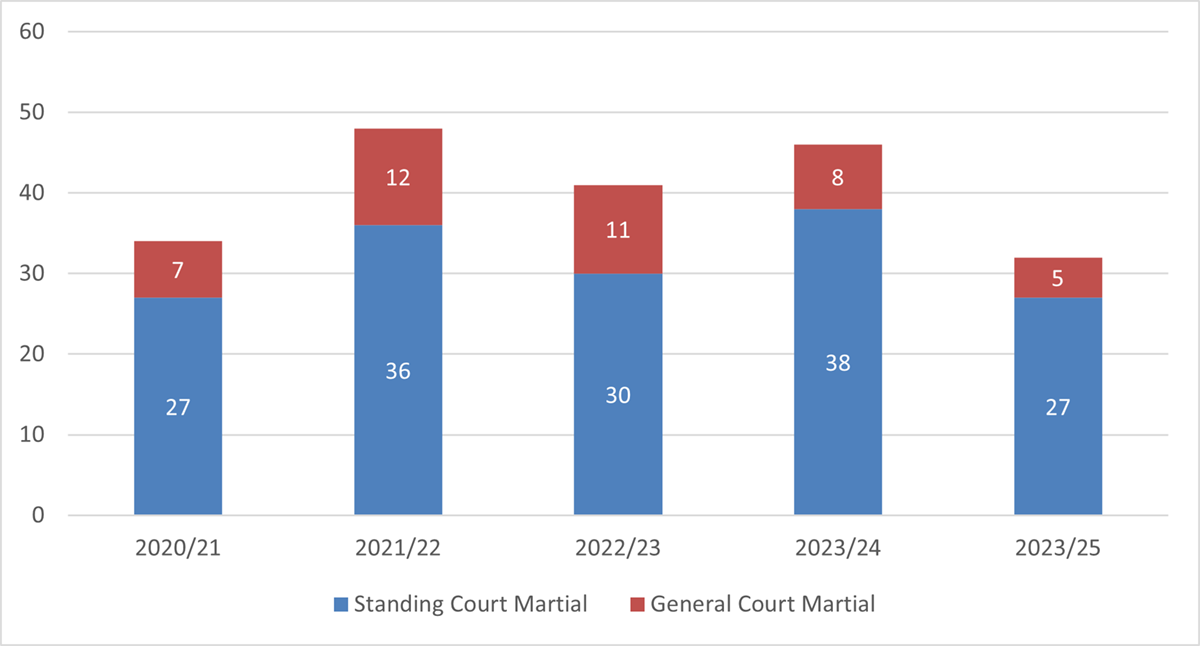
Graph breakdown: Number and type of completed courts martial over the past five reporting periods
| 2020/21 | 2021/22 | 2022/23 | 2018/19 | 2024/25 | |
|---|---|---|---|---|---|
| General Court Martial | 7 | 12 | 11 | 8 | 5 |
| Standing Court Martial | 27 | 36 | 30 | 38 | 27 |
2.6. Appeals
52. The complete list of appeals completed at the CMAC, including motions heard, is included at Annex B.
2.7 Summaries of Notable Appeals
R v Edwards, 2024 SCC 15
53. In nine (9) separate courts martial, Military Judges stayed proceedings under section 24(1) of the Charter after finding that their continued liability under the Code of Service Discipline (CSD) undermined their judicial independence. On appeal, the CMAC unanimously overturned those stays, ruling that Military Judges meet the constitutional standards of impartiality and independence required by section 11(d) of the Charter. On final appeal, a 6–1 majority of the SCC upheld the CMAC’s decision. The Court found that, despite being subject to the CSD, military judges maintain sufficient independence and impartiality. While acknowledging that alternative policy models could be considered, the SCC held that the current framework under the NDA appropriately reflects the unique needs of the military justice system, including discipline, morale, and operational effectiveness. The SCC emphasized that constitutional guarantees must be interpreted in light of the distinct context of military justice, which operates in parallel to, but separate from, the civilian justice system. This decision conclusively resolves the constitutional debate over the independence of military judges and reinforces confidence in the military justice system.
R v O’Dell, 2024 CMAC 1
54. Corporal O’Dell was convicted of sexual assault by a GCM and sentenced to 42 days of detention along with a mandatory 20-year SOIRA order. Cpl O’Dell appealed both his conviction and his sentence. On appeal, the CMAC dismissed the conviction appeal but allowed the sentence appeal in part, setting aside the SOIRA order. Of particular importance to military justice, the CMAC confirmed that Military Judges are bound not only by the Military Rules of Evidence but also by the common law rules of evidence, including their ongoing caselaw development. The CMAC noted that Military Judges are also bound by the common law rules in relation to self-serving evidence. It also reaffirmed that prior consistent statements are presumptively inadmissible and that such statements are excluded because “repetition does not, and should not be seen to, enhance the value or truth of testimony.” The CMAC underscored that courts martial must apply both statutory and common law evidentiary principles, including those that evolve through civilian jurisprudence.
R v Meeks, 2024 CMAC 9
55. Sergeant Meeks was convicted of assault causing bodily harm and sentenced to 30 days of detention. After being deemed medically disabled and administratively released from the CAF, he appealed the sentence, arguing that his release rendered the detention order inoperative under the authority of R v Tupper. Given the circumstances, the prosecution did not oppose suspending the sentence but maintained that administrative release does not render a detention sentence inoperative, and that Tupper should be revisited. The CMAC allowed the appeal and suspended the sentence. It concluded that administrative release does not render a sentence of detention inoperative, that Tupper should be read narrowly, and that sentencing remains governed by the principle of fitness. The CMAC noted that generally, if an appellate court is considering overturning a decision and not following horizontal stare decisis, a five-justice division is ordered to consider the arguments and that it did not have the ability, under the NDA, to order a five-justice division of the Court.
R v JL, 2024 CMAC 10
56. In this case, the CMAC considered whether the military justice system respects the constitutional rights of young military members. J.L., a 17-year-old accused of sexual assault, argued that the military justice system fails to recognize the principle of fundamental justice that young persons are presumed to have less moral blameworthiness and culpability than adults. The CMAC confirmed that this principle is fundamental to a fair legal system and applies within the military justice system. While the military justice system is not required to replicate the Youth Criminal Justice Act (YCJA), it must offer comparable protections. The CMAC found that the failure of the NDA to articulate the principle or to adopt a separate regime for the prosecution of young military persons does not inevitably lead to the conclusion that the military justice system is constitutionally deficient. The CMAC added that Military Judges are provided with broad discretion under the NDA, which allows them to protect the privacy of young military members, and to prioritize the very principles that underpin the YCJA. However, the CMAC held that mandatory consequences under the NDA such as automatic criminal records and mandatory minimum sentences, are inconsistent with the Charter when applied to young military members without accounting for their reduced moral blameworthiness.